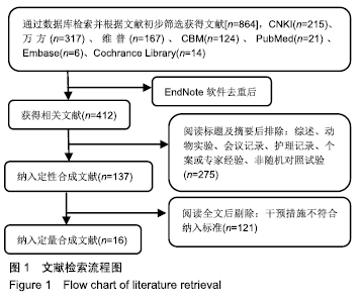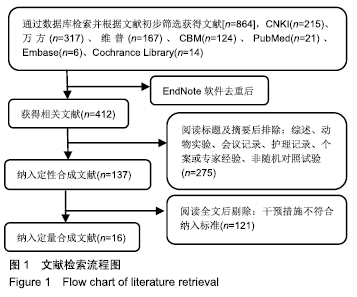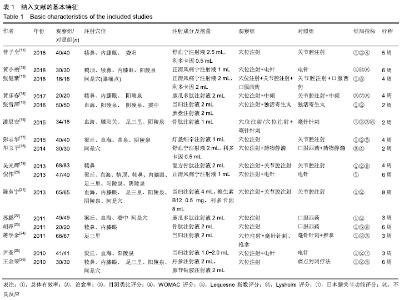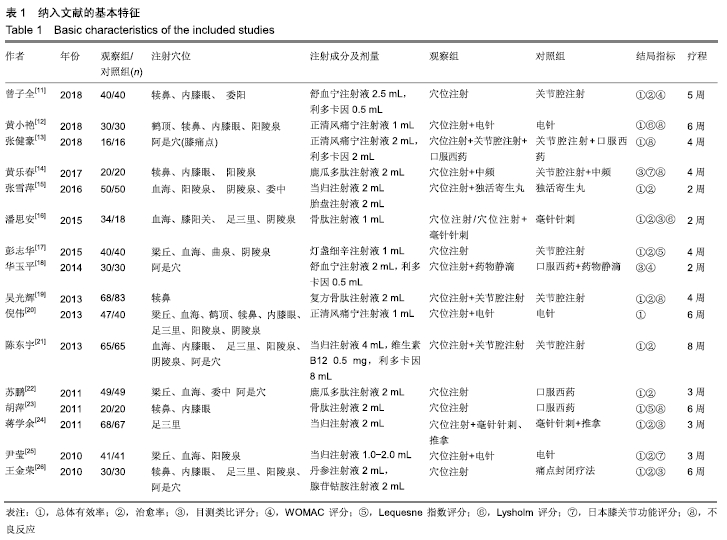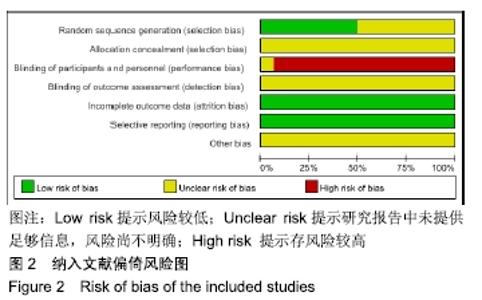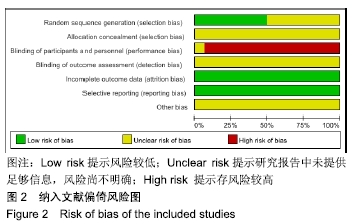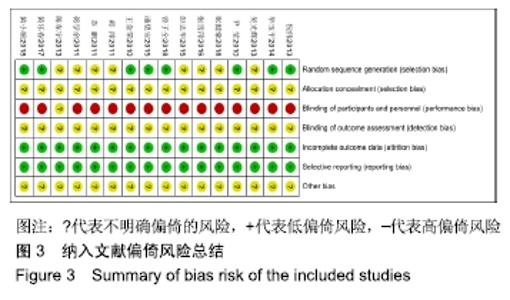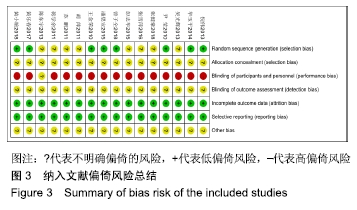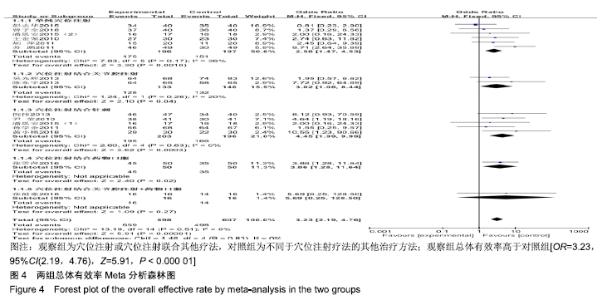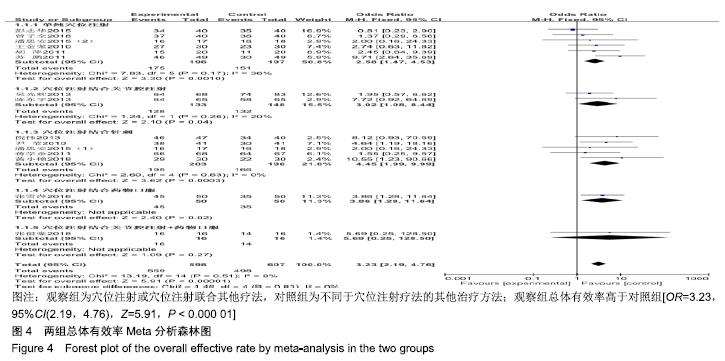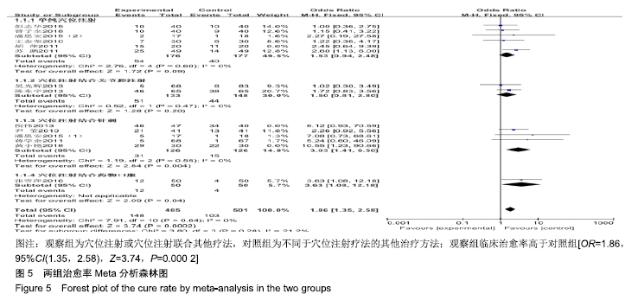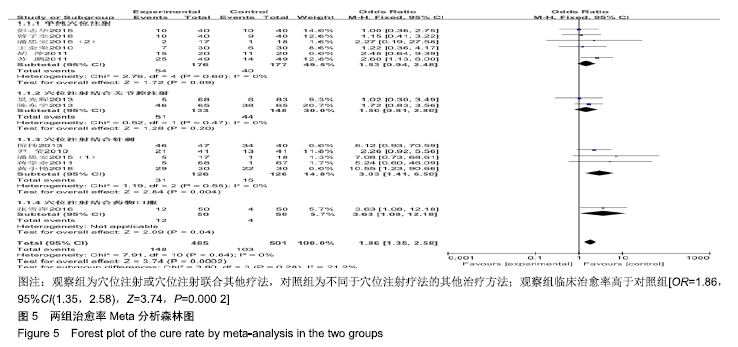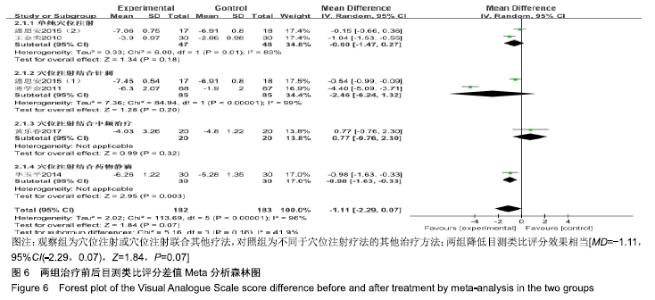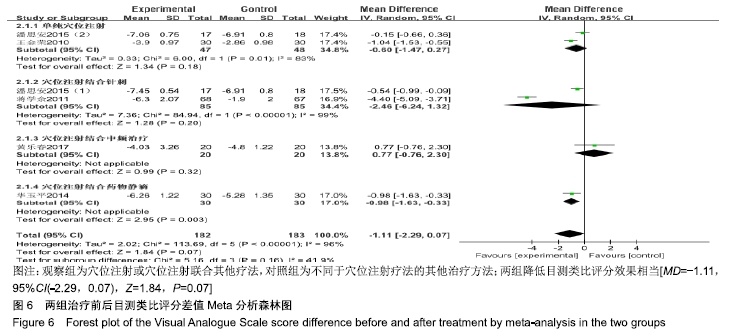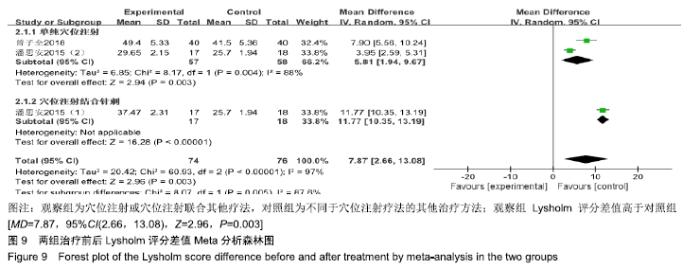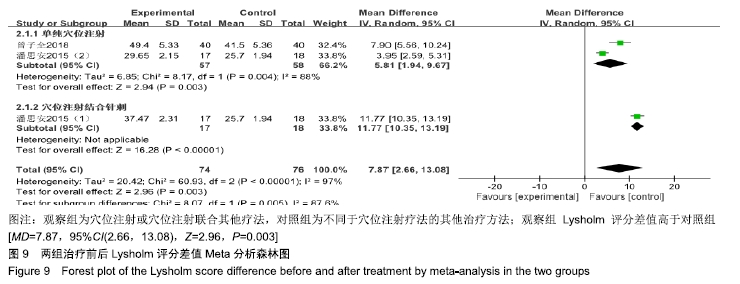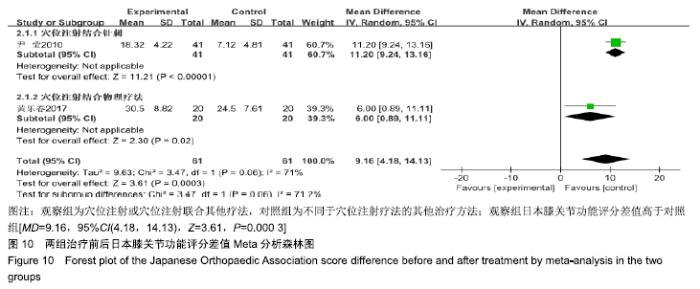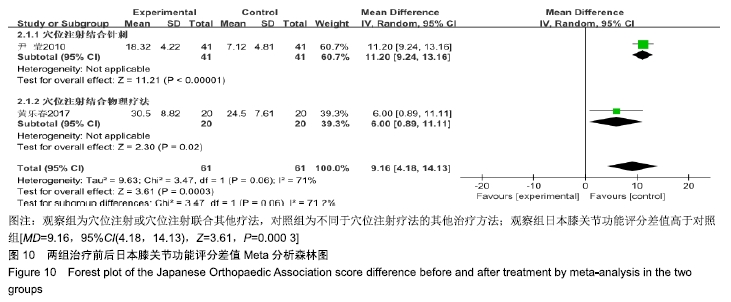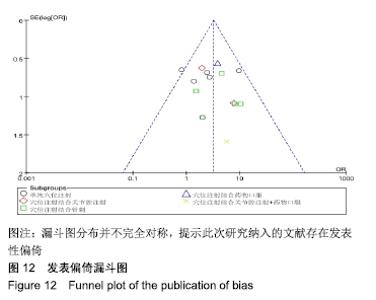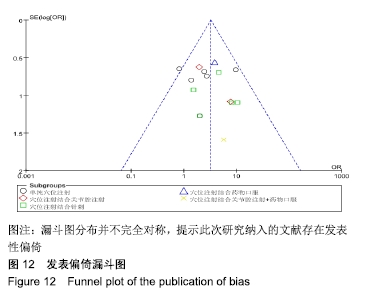Chinese Journal of Tissue Engineering Research ›› 2020, Vol. 24 ›› Issue (18): 2879-2887.doi: 10.3969/j.issn.2095-4344.2641
Previous Articles Next Articles
Meta-analysis of the effect of acupoint injection on pain
improvement and joint function in patients with knee osteoarthritis
Deng Kaifeng1, Shang Xinyang1, Zhu Shengwang1, Li Shuzhen2, Zhu Ying2, Chen Rilan2
- 1Guangxi University of Chinese Medicine, Nanning 530001, Guangxi Zhuang Autonomous Region, China; 2Ruikang Hospital Affiliated to Guangxi University of Chinese Medicine, Nanning 530011, Guangxi Zhuang Autonomous Region, China
-
Received:2019-10-21Revised:2019-10-25Accepted:2019-12-05Online:2020-06-28Published:2020-04-07 -
Contact:Chen Rilan, Chief physician, Professor, Master’s supervisor, Ruikang Hospital Affiliated to Guangxi University of Chinese Medicine, Nanning 530011, Guangxi Zhuang Autonomous Region, China -
About author:Deng Kaifeng, Master candidate, Guangxi University of Chinese Medicine, Nanning 530001, Guangxi Zhuang Autonomous Region, China -
Supported by:the National Natural Science Foundation of China, No. 81460763 and 81960908; the Natural Science Foundation of Guangxi Zhuang Autonomous Region, No. 2017JJA140564z; the Guangxi Medical and Health Appropriate Technology Development and Promotion Project of Health and Family Planning Commission of Guangxi Zhuang Autonomous Region, No. S2017057
CLC Number:
Cite this article
Deng Kaifeng, Shang Xinyang, Zhu Shengwang, Li Shuzhen, Zhu Ying, Chen Rilan.
Meta-analysis of the effect of acupoint injection on pain
improvement and joint function in patients with knee osteoarthritis
share this article
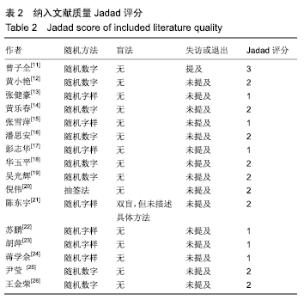
2.3 纳入研究的质量评价 采用Jadad评分量表(≤2分判定为低质量,≥3分判定为高质量)对纳入的16项研究进行评估,结果显示:1项为高质量研究[11],得分为3分,其余15项均为低质量研究[12-26],9项研究得分为2分[12,14,16,18-21,25-26],其余6项研究均为1分[13,15,17,22-24]。8项试验使用随机数字表法[11-12,14,16,18-19,25-26],1项研究采用抽签法[20],其余7项试验只提及了随机字样[13,15,17,21-24]。所有研究皆未提及随访时间,所有研究皆报告了两组之间基线相似性一致。但以上文献均未将原始数据进行呈现,只能通过研究者的总结报告进行评价,使分析存在信息偏倚的可能。由于大部分穴位注射疗法的文献均未对研究人员及受试人员施盲,导致实施性偏倚风险评估大部分为风险较高,见表2,图2,3。 "
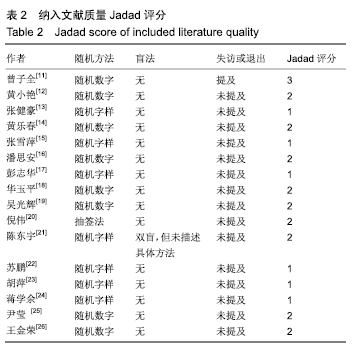
| [1] CHEN WH, LIU XX, TONG PJ, et al. Diagnosis and management of knee osteoarthritis:Chinese medicine expert consensus(2015).Chin J Integr Med.2016;22(2):150-153. [2] SCOTT D, KOWALCZYK A. Osteoarthritis of the knee.BMJ Clin Evid.2007;2007:1121. [3] GLYN-JONES S, PALMER AJ, AGRICOLA R, et al. Osteoarthritis. Lancet.2015;386(9991):376-387. [4] COLES LS, FRIES JF, KRAINES RG, et al.From experiment to experience: side effects of nonsteroidal anti-inflammatory drugs.Am J Med.1983;74(5):820-828. [5] CLIVE DM, STOFF JS. Renal syndromes associated with nonsteroidal antiinflammatory drugs.N Engl J Med. 1984; 310(9): 563-572. [6] 李丽,李宁,吴滨.针灸治疗膝关节骨性关节炎的文献计量学分析[J].中国针灸,2007,27(11):862-864. [7] 乔迪,张卫华.退行性膝关节炎穴位注射疗法文献研究[J].陕西中医学院学报,2015,38(4):104-105. [8] CHINESE RHEUMATOLOGY ASSOCIATION.Guidelines for diagnosis and treatment of osteoarthritis(protocol).Zhonghua Feng Shi Bing Xue Za Zhi.2003;7(11):702-704. [9] 郑筱萸.中药新药临床研究指导原则[M].北京:中国医药科技出版社,2002:349. [10] JADAD AR, MOORE RA, CARROLL D, et al. Assessing the quality of reports of randomized clinical trials:is blinding necessary?.Control Clin Trials.1996;17(1):1-12. [11] 曾子全,赵传喜,刘文刚.中药穴位注射治疗早中期膝关节骨性关节炎的近期疗效观察及肌力分析[J].现代医药卫生, 2018, 34(20): 3114-3118. [12] 黄小艳,付杰,徐小鸿,等.电针联合正清风痛宁穴位注射治疗膝关节骨性关节炎的临床研究[J].基层医学论坛, 2018,22(19): 2716-2717. [13] 张健豪,江花.玻璃酸钠关节腔注射联合正清风痛宁穴位注射治疗膝骨关节炎疗效观察[J].世界最新医学信息文摘(电子版), 2018,18(28):158-159. [14] 黄乐春,胡惠民,袁小敏.鹿瓜多肽注射液穴位注射联合电中频治疗膝关节骨性关节炎临床观察[J].新中医,2017,49(9):75-77 [15] 张雪萍.穴位注射治疗膝骨性关节炎50例的临床观察和护理体会[J].中国社区医师,2016,32(4):168,170. [16] 潘思安,黄洁,赵钊,等.针刺结合骨肽穴位注射治疗肝肾亏虚型膝骨关节炎的疗效观察[J].辽宁中医杂志,2015,42(1):154-157. [17] 彭志华,张胜.灯盏细辛注射液穴位注射治疗膝骨性关节炎40例疗效观察[J].湖南中医杂志,2015,31(7):87-88. [18] 华玉平,凌敏,代树程,等.舒血宁穴位注射治疗早中期膝骨性关节炎30例[J].江西中医药,2014,45(12):35-36. [19] 吴光辉,杨梅,凌惠敏.穴位注射复方骨肽联合玻璃酸钠膝关节腔注射治疗膝骨性关节炎的疗效[J].实用疼痛学杂志, 2013,9(1): 41-43. [20] 倪伟.电针配合穴位注射正清风痛宁治疗膝骨性关节炎47例临床观察[J].中医药导报,2013,19(12):90-91. [21] 陈东宇.穴位注射配合腔内注药治疗退行性膝关节炎65例[J].河南中医,2013,33(12):2211-2212. [22] 苏鹏.老年性膝骨性关节病的临床治疗[J].医学信息(中旬刊), 2011,24(3):913. [23] 胡萍.骨肽注射液穴位注射治疗膝骨性关节炎[J].中国医药科学, 2011,1(12):100,121. [24] 蒋学余.委中穴注射配合针刺推拿治疗膝骨性关节炎68例临床观察[J].中医药导报,2009,15(6):62-63. [25] 尹莹,王英淑.电针配合穴位注射治疗膝骨性关节炎的疗效观察[J].世界针灸杂志(英文版),2010,20(4):37-42. [26] 王金荣,王永志.穴位注射法治疗膝关节骨性关节炎随机对照研究[J].北京中医药,2010,29(11):854-856. [27] DEMOLY P, BOUSQUET PJ, MESBAH K, et al. Visual analogue scale in patients treated for allergic rhinitis: an observational prospective study in primary care: asthma and rhinitis.Clin Exp Allergy.2013;43(8):881-888. [28] BELLAMY N, BUCHANAN WW, GOLDSMITH CH, et al. Validation study of WOMAC:a health status instrument for measuring clinically important patient relevant outcomes to antirheumatic drug therapy in patients with osteoarthritis of the hip or knee.J Rheumatol.1988;15(12):1833-1840. [29] LEQUESNE M, MERY C, SAMSON M, et al. Indexes of severity for osteoarthritis of the hip and knee. Validation-value in comparison with other assessment tests.Scand J Rheumatol Suppl. 1987;65:85-89. [30] LYSHOLM J, GILLQUIST J. Evaluation of knee ligament surgery results with special emphasis on use of a scoring scale.Am J Sports Med.1982;10(3):150-154. [31] 张光铂,李中实.膝关节功能评定[J].中国康复医学杂志, 1991, 6(2): 80. [32] 肖丽,李敏,赵凌艳,等.电针后穴位注射威灵仙注射液对家兔骨关节炎基质金属蛋白酶的影响[J].针灸临床杂志, 2015,31(11): 69-71. [33] LI X, YU C, LU Y, et al. Pharmacokinetics,tissue distribution,metabolism,and excretion of depside salts from Salvia miltiorrhiza in rats.Drug Metab Dispos.2007;35(2):234-239. [34] 王志良,冷健,崔红燕.腺苷钴胺的临床应用进展[J].中国药事, 2006,20(2):453-455. [35] WIENENKE H, LABRENHOFFER P. Basic principle of radiosurgil systems and their applications in arthroseopy. Unfallchintrg.2003;106(1):2-12. [36] 邓斌,邓运明,王力,等.灯盏细辛注射液配合神灯治疗膝骨关节炎疗效观察[J].中医正骨,2007,19(2):10-11,13,82. [37] 孙芳,王璐,闫滨,等.银杏叶提取物活性成分及其药理作用[J].山东中医杂志,2014,33(3):221-223. [38] 姚阿玲.发表偏倚对Meta分析结果影响的模拟研究[D].广州:南方医科大学,2015. |
| [1] | Li Dadi, Zhu Liang, Zheng Li, Zhao Fengchao. Correlation of total knee arthroplasty efficacy with satisfaction and personality characteristics [J]. Chinese Journal of Tissue Engineering Research, 2021, 25(9): 1346-1350. |
| [2] | Wei Wei, Li Jian, Huang Linhai, Lan Mindong, Lu Xianwei, Huang Shaodong. Factors affecting fall fear in the first movement of elderly patients after total knee or hip arthroplasty [J]. Chinese Journal of Tissue Engineering Research, 2021, 25(9): 1351-1355. |
| [3] | Lü Zhen, Bai Jinzhu. A prospective study on the application of staged lumbar motion chain rehabilitation based on McKenzie’s technique after lumbar percutaneous transforaminal endoscopic discectomy [J]. Chinese Journal of Tissue Engineering Research, 2021, 25(9): 1398-1403. |
| [4] | Chen Junming, Yue Chen, He Peilin, Zhang Juntao, Sun Moyuan, Liu Youwen. Hip arthroplasty versus proximal femoral nail antirotation for intertrochanteric fractures in older adults: a meta-analysis [J]. Chinese Journal of Tissue Engineering Research, 2021, 25(9): 1452-1457. |
| [5] | Chen Jinping, Li Kui, Chen Qian, Guo Haoran, Zhang Yingbo, Wei Peng. Meta-analysis of the efficacy and safety of tranexamic acid in open spinal surgery [J]. Chinese Journal of Tissue Engineering Research, 2021, 25(9): 1458-1464. |
| [6] | Hu Kai, Qiao Xiaohong, Zhang Yonghong, Wang Dong, Qin Sihe. Treatment of displaced intra-articular calcaneal fractures with cannulated screws and plates: a meta-analysis of 15 randomized controlled trials [J]. Chinese Journal of Tissue Engineering Research, 2021, 25(9): 1465-1470. |
| [7] | Huang Dengcheng, Wang Zhike, Cao Xuewei. Comparison of the short-term efficacy of extracorporeal shock wave therapy for middle-aged and elderly knee osteoarthritis: a meta-analysis [J]. Chinese Journal of Tissue Engineering Research, 2021, 25(9): 1471-1476. |
| [8] | Gao Yan, Zhao Licong, Zhao Hongzeng, Zhu Yuanyuan, Li Jie, Sang Deen. Alteration of low frequency fluctuation amplitude at brain-resting state in patients with chronic discogenic low back pain [J]. Chinese Journal of Tissue Engineering Research, 2021, 25(8): 1160-1165. |
| [9] | Wang Yongsheng, Wu Yang, Li Yanchun. Effect of acute high-intensity exercise on appetite hormones in adults: a meta-analysis [J]. Chinese Journal of Tissue Engineering Research, 2021, 25(8): 1305-1312. |
| [10] | Kong Desheng, He Jingjing, Feng Baofeng, Guo Ruiyun, Asiamah Ernest Amponsah, Lü Fei, Zhang Shuhan, Zhang Xiaolin, Ma Jun, Cui Huixian. Efficacy of mesenchymal stem cells in the spinal cord injury of large animal models: a meta-analysis [J]. Chinese Journal of Tissue Engineering Research, 2021, 25(7): 1142-1148. |
| [11] | Zhao Zhongyi, Li Yongzhen, Chen Feng, Ji Aiyu. Comparison of total knee arthroplasty and unicompartmental knee arthroplasty in treatment of traumatic osteoarthritis [J]. Chinese Journal of Tissue Engineering Research, 2021, 25(6): 854-859. |
| [12] | Zhang Nianjun, Chen Ru. Analgesic effect of cocktail therapy combined with femoral nerve block on total knee arthroplasty [J]. Chinese Journal of Tissue Engineering Research, 2021, 25(6): 866-872. |
| [13] | Wu Gang, Chen Jianwen, Wang Shilong, Duan Xiaoran, Liu Haijun, Dong Jianfeng. Simple HyProCure subtalar stabilization in treatment of adolescent flexible flatfoot combined with painful accessory navicular bone [J]. Chinese Journal of Tissue Engineering Research, 2021, 25(6): 901-905. |
| [14] | Huang Dengcheng, Wang Zhike, Cao Xuewei. Intravenous, topical tranexamic acid alone or their combination in total knee arthroplasty: a meta-analysis of randomized controlled trials [J]. Chinese Journal of Tissue Engineering Research, 2021, 25(6): 948-956. |
| [15] | Li Yan, Wang Pei, Deng Donghuan, Yan Wei, Li Lei, Jiang Hongjiang. Electroacupuncture for pain control after total knee arthroplasty: a meta-analysis [J]. Chinese Journal of Tissue Engineering Research, 2021, 25(6): 957-963. |
| Viewed | ||||||
|
Full text |
|
|||||
|
Abstract |
|
|||||
